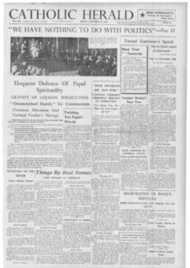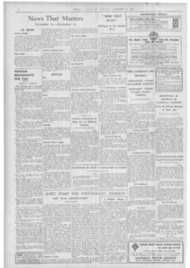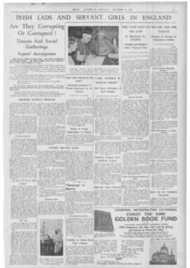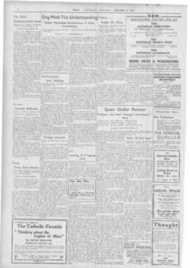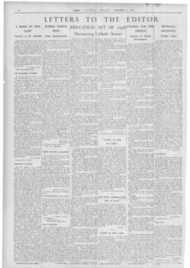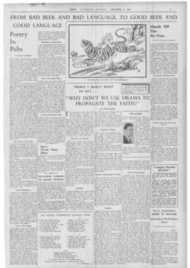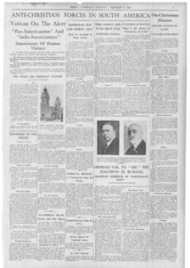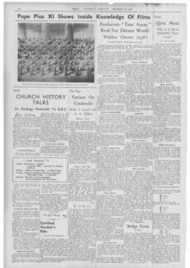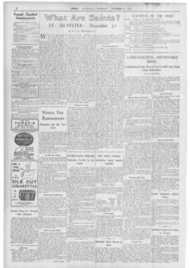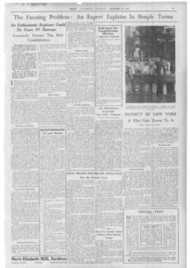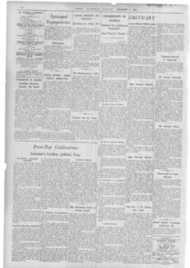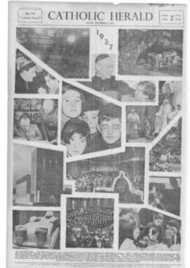Page 6, 31st December 1937
Page 6

Report an error
Noticed an error on this page?If you've noticed an error in this article please click here to report it.
Tags
Share
Related articles
The Teachers' Conference
Teachers Must Join Nut And Attend Meetings
Fifty Years Ago Catholic Schools Faced Extinction
Teachers' Role In Social Revolution
Marriage Talks For Schools
EDUCATION ACT OF 1936 Threatening Catholic Roots?
Sue—The 25th annual conference of the Catholic Teachers' Federation is now meeting in Cardiff, and among the resolutions before it are two on what may be considered the most important piece of Government legislation since 1829—the Education Act of 1936, which, some contend, strikes in an insidious manner at the very roots of Catholicism in England.
In 1939 the Act will bring into effect changes that may force hundreds of children to attend non-Catholic schools; reduce by half the time given to religious instruction; give infants unduly long distances to walk to school; render many Catholic teachers unemployed; and in some cases place a tremendous burden of debt on the Church.
The 1936 Education Act empowers Local Education Authorities to make grants to managers of voluntary schools under certain conditions for enlarging, improving, or building schools.
Raising the school age entails a large increase in school accommodation. Local authorities are therefore reorganising Church (or non-provided) schools. It is with London that I will deal. The London County Council decided to group such schools into senior and junior sections. Grants will be made to managers of the two senior schools to enable them to be reconditioned and brought up to the L.C.C. standard.
But junior schools will get no help. The removal of seniors may necessitate structural alterations to junior schools—the Church will have to pay that, with borrowed money.
Since re-grouping. in some cases, will take place over a wide area, tiny children attending the old mixed schools will have to go much farther to their new school, starting earlier, coming home later, tired out. Possibly they will have to go through busy traffic centres, they will cross the roads tootir .ed to look which way they are going
The reorganisation will displace numbers of Catholic teachers; what will happen to them? We are not told. Children now at training colleges for teachers will have an immeasurably smaller chance now of securing employment.
Two Catholic Commissions are carrying out the reorganisation of schools in London, their schemes being submitted to the L.C.C.
for approval. One Commission sits for Westminster, one for Southwark. In Westminster a scheme has been completed, and has been approved by the L.C.C.
Why has no one heard of this until it has been completed in secrecy?
In Southwark the scheme has not been completed, and I learned that the Commis sion is facing great difficulties. Bishop Brown, foremost expert on Catholic education, told me: " If Catholic school managers refused to reorganise under the scheme, they could be left without any of the special services now provided at L.C.C. centres, such as manual training, cookery and many other subjects.
" When schools are re-grouped. it is, in many cases, necessary to improve senior schools to fulfil the requirements of the L.C.C., but although such a school may have to be structurally altered because of senior departments being moved to other schools, grants can only be made for senior schools, or senior parts of schools. Junior schools will get no grants.
" The extra burden of cost which would be placed on Southwark, for example, cannot be estimated until the final schemes are known. The cost would have to be met by loan. The Education Committee of the L.C.C. reported to the Council in July that they estimated that about 78 per cent. of the none provided schools would have to be regrouped and reorganised. I cannot say yet how this would affect Southwark, or how many would have to be reconditioned, but it must be remembered that few Catholic schools are up to the latest standards."
Will not this Act be a mortal blow, unless Catholics are fully informed and take action. What will happen to the hundreds of children who will have to go to undenominational schooLs?
The prospect for young teachers is decidedly bad. At the present time the L.C.C. has something like 1,200 floating teachers. The position after re-grouping will be worse. Catholic parents ought to have this position made clear to them. Do Catholics in London realise the upheaval in their midst—and it will spread?
The Morning Post stated in 1934: " The Church of England schools, the original backbone and foundation of the educational system of this country, are in danger of extinction .. . simultaneously the number of Roman Catholic schools has been growing."
During the year ended March, 1935-1 quote from the Board of Education Report for 1936-110 schools were closed, of which 46 were Council schools, 61 Church of England schools, and three Catholic.
This fact is appreciated by local authorities, if not by Catholics. Here is what Dr. J. O'Donovan said recently when referring to the German sterilisation movement: " It is proposed that that (sterilisation) too should be done in England, and the Bill has been drafted by Parliamentary
draughtsmen. A copy has been sent to every C.atholic Bishop in this country. The thing has not yet become practical politics—it will be quite soon. for I have heard it said in the House of Commons that the problem of unemployment is the problem of the socially unfit, and therefore one solution is surgical.
" In 60 years' time only 4 per cent. of the population of England will he chil
dren. Now think of that—it will be a nation of old people. Those 4 per cent. in 60 years' time will be, instead of the majority, museum specimens.
" This is national death. When you look at the birth-rate of the Soviets, it is the end of the White race., and efficient birth control is doing it.
" The Town Clerks of England want our children; they see that it is only the children of the Catholics who can fill their institutions, and keep them open. Our children will be taken by ' administrative pressure' out of the care of Catholic institutions and put into others. for economic reasons and
• not for religious persecution.
Is the reorganisation of schools not a step towards this system of " administrative pressure "?
But why don't we fight it? The Catholic Teachers' Federation are to discuss the Act, hut how? One resolution proposes that the Government amend certain sections of the Act in tuner that proposals to the local authorities for reorganisation may he made eighteen months after the appointed das and be carried out not later than three years after the appointed day.
Glorious procrastination, born of an unwillingness to fight! Defer proposals for eighteen months!
Why will we not realise that the Catholic Church numbered in 1935 almost as many as Easter Communicants of the Church of England, established Church of the land; that the Catholic Church was the only one to increase in numbers and power during that, and last year.
What are two and a half millions among 40 millions (the population of England and Wales), it may be asked. The fact remains that when elections are to be fought it is, in the majority of cases, to the churches and local clergy that candidates appeal. It is in church halls and in the words from the pulpits that elections can be won or lost. Many of the great reforms of the last century have been carried out with the collaboration of the churches, and without them would have failed.
It is perfectly feasible that, were Catholics more awakened to their powers as a body so united, over 2,000,000 strong, then indeed something definite might be done towards settling many of the bewildering questions troubling the clergy today, foremost among which is this great problem of education.
J. P. GALLAGHER.
43, Croxted Road, West Dulwich, S.E.21.
blog comments powered by Disqus


